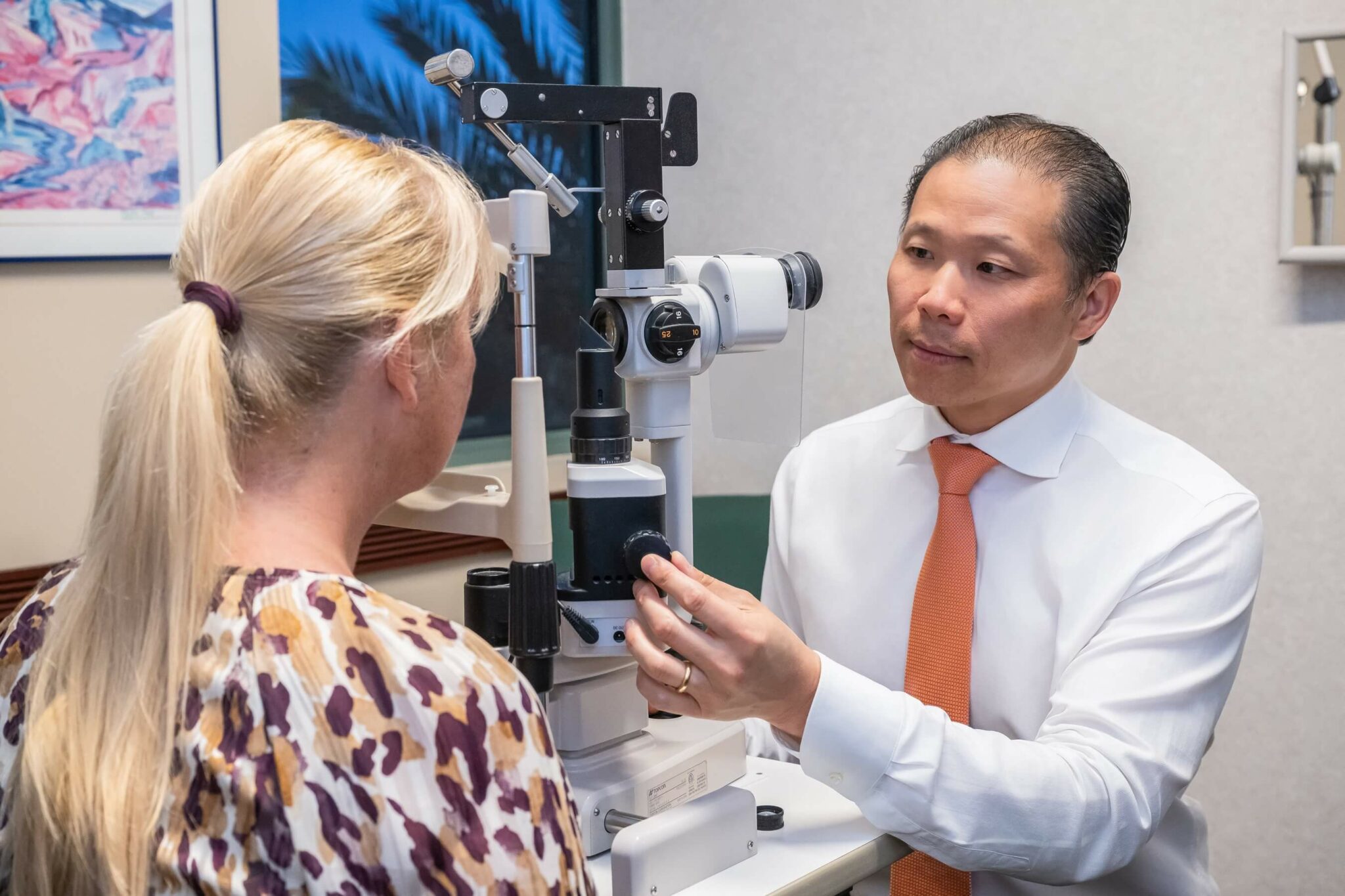Macular Hole
What is Macular Hole?
The macula is the central part of the retina and is responsible for detailed vision such as reading. A macular hole is an abnormal opening in the center of the macula, and it can lead to loss of central vision.

What are the Symptoms of Macular Hole?
Symptoms of a macular hole include blurry and distorted vision in the affected eye. The symptoms can worsen as the hole enlarges. Often, people notice the macular hole only when covering the opposite eye.
Macular hole is most commonly a disease of people over 50 years of age. As the vitreous gel in the eye undergoes changes, it can pull on the macula and pull a small hole. There may be symptoms in the early phase of this pulling. The earliest form of a macular hole can actually resolve on its own approximately 50% of the time. If a full-thickness hole develops, it is unlikely to improve. Central vision is usually lost, although side vision is preserved. Macular holes are not usually a blinding disease.
How is Macular Hole Diagnosis?
Macular holes can be detected with a dilated examination of the eyes by your ophthalmologist. As retinal specialists, we have tests designed to diagnose the problem and determine how much it is contributing to your visual complaint. Fluorescein angiography can assess the health of the macula. Optical Coherence Tomography (OCT) is a state of the art, non-invasive test done in the office which can demonstrate the macula and any associated hole with great precision.
How is Macular Hole Treated?
The most effective treatment for macular hole is vitrectomy surgery. During this outpatient procedure, the vitreous gel is removed from the eye with tiny instruments. The gel is replaced with gas and is eventually replaced with the eye’s natural fluid as the macular hole heals. The patient must maintain face down position for several days after the surgery in order to keep the gas in contact with the macula. There are special chairs and face rests available to help you maintain this position. You cannot fly in an airplane while the gas is in the eye because high altitudes can cause expansion of the gas which may damage the eye.
Fortunately, surgery is typically very successful in achieving hole closure and subsequently improving vision. Vision does not typically come back all the way, but a substantial improvement often occurs. People with macular holes that have been present for a longer time (more than six months) may not experience as much improvement. Also, if there are other eye diseases present, there may not be as much improvement. If you have not had cataract surgery, you will likely need cataract surgery some time after your macular hole surgery. Only with a thorough examination will your ophthalmologist know how much you are likely to improve following surgery.
Certain types of macular holes may be treated with a medication that is injected into the vitreous cavity that in early clinical studies was successful at closing some macular holes without vitrectomy.
Macular Pucker
What is Macular Pucker?
The macula is the central part of the retina, and it is responsible for detailed vision such as reading. A macular pucker is a thin, transparent scar tissue which grows over the macula. This thin sheet can contract and form wrinkles in the retina and distort vision. This condition is also known as epiretinal membrane, cellophane maculopathy, and premacular fibrosis.

What are the Symptoms of Macular Pucker?
Symptoms of macular pucker include blurry and distorted vision in the affected eye. Straight lines such a table edges may appear curved or wavy. These symptoms may range from mild to severe, and one or both eyes may be affected.
Most typically, macular puckers occur in people over 50 years of age. However, younger people can be affected as well. There may be associated eye conditions such as:
How is Macular Pucker Diagnosed?
Macular puckers can be detected by a complete eye exam with your ophthalmologist. As retinal specialists, our focus is to determine how much the macular pucker is contributing to your visual symptoms and what can be done to remedy the problem.Fluorescein Angiography is a test performed in the office which can help us determine the health of the macula. Optical Coherence Tomography (OCT) is a state-of-the-art test which helps us actually visualize how much the pucker is pulling on the macula.
How do Eye Doctors Treat Macular Pucker?
The only treatment is vitrectomy surgery where the thin layer of scar tissue is actually removed with tiny instruments by your retinal specialist. This is an outpatient surgery and typically takes about 45 minutes. It takes several weeks for the retina to heal and to realize the full visual benefit of the surgery. Usually there is a noticeable improvement in vision, although not all the way back to normal.
There are no drops, laser, or other treatments that will help. Glasses only help up to a point, but they do nothing for the distortion. Fortunately, most people with a macular pucker do not need surgery. Surgery should only be considered if the visual benefit is interfering with your everyday life.
